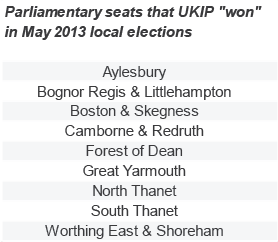An Analysis
The Fabian Society has published a report by Marcus Roberts, supported by research from Rob Ford and Ian Warren, about the threat that UKIP poses to Labour.
The report is titled "Revolt on the Left"
The report’s “research cross referenced demographic data based on ‘Left behind’ Mosaic groups favourable to UKIP with 2010 Parliamentary majorities which considered the scale of UKIP threat in terms of critical, very serious, serious and moderate ratings”.
To burrow into the detail it is necessary to scour the appendixes to the report. Any analysis has to start somewhere – and this is with the seats that the authors list under the headings “critical” and “very serious”, on the simple ground that these are the most likely ones in which UKIP will shape the result.
Seats at risk from a UKIP challenge (Table One):
- Critical Risk: Clacton, Great Grimsby, South Thanet, Thurrock.
- High Risk: Dudley North, Eastleigh, Great Yarmouth, Plymouth Moor View, Rother Valley,Rotherham, Waveney.
Labour-Conservative local contests where UKIP have most potential to damage Labour prospects (Table Five):
- Critical Risk: Southampton Itchen, Great Grimsby, Walsall North, Plymouth Sutton and Devonport.
- Very Serious Risk: Plymouth Moor View, Carlisle, Lincoln, Telford, Dudley North, Halifax,Wolverhampton North-East, Birmingham Edgbaston.
Labour-Conservative seats where UKIP have most potential to damage Conservative prospects (Table Seven):
- Critical Risk: Warwickshire North, Cardiff North, Broxtowe, Stroud.
Seats where UKIP have most potential to damage Labour prospects (Table Four):
- Critical Risk: Sheffield Central, Southampton Itchen, Ashfield, Hull North, Bradford East, Norwich South, Great Grimsby, Walsall North, Thurrock, Rochdale, Plymouth Sutton and Devonport.
- Very Serious Risk: Chesterfield, Plymouth Moor View, Carlisle, Lincoln, Telford, Dudley North,Halifax, Wolverhampton North East, Birmingham Edgbaston.
Seats where UKIP have most potential to damage Conservative prospects (Table 6):
- Critical Risk: Camborne and Redruth, Warwickshire North, Dorset Mid and North Poole, Oxford West and Abingdon, Solihull, Truro and Falmouth, Newton Abbot, Cardiff North, Wells, Broxtowe,Somerton and Frome, Stroud, Montgomeryshire.
- Very Serious Risk: St Austell and Newquay, St Ives, Harrogate and Knaresborough, Devon West and Torridge, Cornwall North.
Now that this roll-call is complete, let’s see what damage is done to which parties if the Critical Risk is delivered.
Seats gained by the Conservatives: Southampton Itchen, Great Grimsby, Walsall North.
Seats gained by Labour: Warwickshire North, Cardiff North, Broxtowe, Stroud.
A Labour net gain of one from the Conservatives
But that’s only if one is looking at the Conservative-Labour marginals.
If the Critical Risk is delivered in other Labour-held seats, we have -
Seats gained by the Liberal Democrats: Sheffield Central, Ashfield, Hull North, Rochdale.
A Labour loss of four to the Liberal Democrats.
And if the Critical Risk is delivered in other Conservative-held seats, we have -
Seats gained by the Liberal Democrats: Camborne and Redruth, Oxford West and Abingdon,Truro and Falmouth, Newton Abbot, Montgomeryshire.
A Conservative loss of five to the Liberal Democrats.
But all that is only looking at Critical risk. Now let’s see what damage is done to which parties if the Very Serious Risk is delivered.
Seats also gained by the Conservatives: Plymouth Moor View, Telford, Dudley North, Halifax,Wolverhampton North-East, Birmingham Edgbaston.
Seats also gained by the Liberal Democrats: Chesterfield, Harrogate and Knaresborough, Devon West and Torridge.
The Conservatives are now on a net gain of five from Labour, and a net loss of seven to the Liberal Democrats.
A number of qualifications:
- Not factored in are the possible UKIP gains because the main interest is in the effect of a strong UKIP vote on Conservative-Labour marginals.
- Similarly, it is assumed in the non-marginals that the party which was second in 2010 gains the seat. This is both an objective measure and a dubious one. If Sheffield Central, for example, really is at Critical Risk, the party most likely to gain is UKIP.
- It can be argued that measuring Critical Risk and Very Serious Risk is too conservative (with a small c) and that UKIP’s buoyancy in the polls would justify also looking at Serious Risk.
- Polls have consistently shown UKIP drawing more support from the Conservatives than from Labour. However, the Fabian paper claims is that this is more so in “safe” Tory seats than the marginals in which UKIP have a very strong presence. In these seats, UKIP actually helps the Conservatives over Labour – but this gain is more than offset by UKIP helping the Liberal Democrats over the Conservatives.
- A crucial question in Conservative-Labour marginals, therefore, is what the effect of UKIP is in such seats in which it does not have a very strong presence. If the Fabian paper is right in the first place, and if again the effect of UKIP in seats where it does not have a strong presence is similar to the effect where it does, the assumption that UKIP will help to deliver Labour the next election must be revised.
- By the same token, any overall movement of UKIP voters back to the Tories overall will have less effect than might be supposed – since their concentration in safe Conservative seats will affect the outcome in those crucial marginals less than has often been supposed.
Summarised from an article by Paul Goodman












